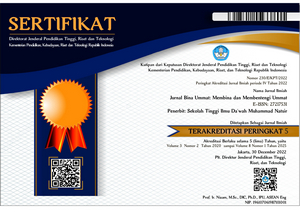DAKWAH MELALUI JALUR PENDIDIKAN
(Studi Terhadap Dakwah M. Natsir Melalui Jalur Pendidikan)
DOI:
https://doi.org/10.38214/jurnaldawahstidnatsir.v8i1.311Keywords:
pendidikan, integral, M. Natsir, DakwahAbstract
Da'wah and education are two aspects that are closely related and inseparable, like two sides of a coin. Essentially, da'wah is an educational process that aims to direct humans towards self-improvement. Thus, an educator also has a position as a da'i who carries out Allah's mandate in calling for goodness and preventing evil. This is what this study is trying to study. This study uses qualitative research methods with the types of library research approaches and historical approaches. The results of this study show that M. Natsir succeeded in doing da'wah through the educational path very well. His contribution to the spread of Islamic teachings through education has had a wide impact and was felt by many parties, including; Natsir's concept of integral education has inspired many people in organizing Islamic education in Indonesia, and initiated the establishment of Islamic campuses in Indonesia.
Downloads
Published
How to Cite
Issue
Section
License
Copyright (c) 2025 Jurnal Da'wah: Risalah Merintis, Da'wah Melanjutkan

This work is licensed under a Creative Commons Attribution 4.0 International License.
This work is licensed under a Lisensi Creative Commons Atribusi 4.0 Internasional.
Authors who publish with this journal agree to the following terms:
- Authors retain copyright and grant the journal right of first publication with the work simultaneously licensed under a Creative Commons Attribution License that allows others to share the work with an acknowledgment of the work's authorship and initial publication in this journal.
- Authors are able to enter into separate, additional contractual arrangements for the non-exclusive distribution of the journal's published version of the work (e.g., post it to an institutional repository or publish it in a book), with an acknowledgment of its initial publication in this journal.
- Authors are permitted and encouraged to post their work online (e.g., in institutional repositories or on their website) prior to and during the submission process, as it can lead to productive exchanges, as well as earlier and greater citation of published work (See The Effect of Open Access).



